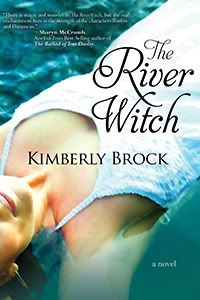 SHOWERS OF BLESSINGS
SHOWERS OF BLESSINGS
By Kimberly Brock
It didn’t matter whether the temperature barely inched its way into the fifties, each Spring I knew that with enough pressure and perseverance, I could convince my granny that it was time for me to go barefoot in the yard. I’d climb out the back door onto the chilled concrete floor of the carport and tip-toe out into the first baby-soft green grass of the season, knowing I was really getting away with something. In less than ten minutes, it felt like my toes would freeze right off, but I would grit my teeth and watch them fall off like Vienna sausages before I’d admit defeat. I’d hop from one foot to the other. I’d march all over the yard, just trying to work up my blood until the warm rush and the glory of such naked heathenism made me forget the cold.
Granny was glad to watch me. She’d take a little worn down yellow broom and sweep off the back porch. She’d laugh and sing little snatches of tunes, Showers of Blessings, while she wandered around the yard, pointing out the first sprigs of mint that grew by an old stump, picking little pieces we could sniff. She’d cup them in the palm of her hand and we’d stick out noses in there and roll our eyes back in our heads, enraptured. We’d inspect the tight little buds on the forsythia bushes and dig around to find the nubs of tulips and daffodils on the verge of shooting up. Purple and yellow crocus always surprised us, seeming to spring out of the ground while our backs were turned, and we would goggle at them like we were seeing a pure wonder, instead of the very same thing we’d seen the year before.
Usually, along with going barefoot, I would be decked out in my favorite regalia, which amounted to a cherished old square dancing skirt that Granny bunched up at the waist and fastened with a diaper pin so it wouldn’t slide off me. Once I discovered I could spin and make that skirt fly out like a wide, white wave, or that I could walk along with the most perfect Scarlet O’Hara sachet, it was rare to find me wearing anything else. High on mint and frozen from the ankles down, I went about picking tiny weedy blooms that sprang up at the edge of the drive, or squatted near the gnarly roots of the pecan trees where bright green moss grew thick and dreamy, fully expecting to converse with fairies.
Nearby, Granny dug up dandelions. I understood this was a long-suffering battle that started years before I was born, Granny dragging her hoe across every square inch of the lawn. I knew her routine – the slow step, the bend of her back, the strength of her arms, the sound of the sharp edge of the hoe digging into soft earth, the sharp tang of dandelion juice in the air. I was aware of her ritual, as surely as I knew where to find the mint or the moss or the exact weight of the cotton ruffles swishing past my calves. But I didn’t understand it. The dandelions were beautiful. They were part of the thrill of those days, bright and round and full. And when I asked her why she had to dig them up, she told me they were weeds and they would ruin her yard.
I was too busy singing our songs and feeling larger than life to really worry about it for a long time. Then one year I got it in my head that the dandelions needed a champion. Who would speak up for the dandelions, if not me? And I argued with her that the little purple flowers at the driveway were just weeds. The mint at the stump was a weed, for we hadn’t planted it there. What was different about the dandelions that made them deserve to be yanked out? If I thought I’d get a good answer, I was disappointed. She stuck to her reason. Dandelions, left alone, would take over. You couldn’t let the dandelions get ahead of you. It wasn’t an answer I liked, but I still had my square-dancing skirt and my toes in the grass, and I was easily distracted from the dandelion’s plight.
One year, we walked down the road to a neighbor’s field where, in memory at least, there must have been an acre of daffodils. We picked as many as we  could carry home. I think of it now and nothing compares. I was most impressed that the farmer’s wife had only planted a few dozen bulbs and Granny explained they’d multiplied, just like the loaves and fishes. It seemed to me there wasn’t much difference between the daffodils and the dandelions and I mentioned it. But Granny wasn’t impressed. She told me one day I’d have a yard and I’d see for myself. I didn’t say that when I had a yard, I wanted the dandelions to take over. I imagined what that would feel like, going barefoot on a lawn of big, yellow blossoms.
could carry home. I think of it now and nothing compares. I was most impressed that the farmer’s wife had only planted a few dozen bulbs and Granny explained they’d multiplied, just like the loaves and fishes. It seemed to me there wasn’t much difference between the daffodils and the dandelions and I mentioned it. But Granny wasn’t impressed. She told me one day I’d have a yard and I’d see for myself. I didn’t say that when I had a yard, I wanted the dandelions to take over. I imagined what that would feel like, going barefoot on a lawn of big, yellow blossoms.
Back at the house, we filled every vase, every mason or jelly jar and even the plastic cups that came from the oatmeal box so daffodils were in every room. The honey-sweet fragrance made us drowsy; our food tasted like daffodils. She said we’d do it every year. If we did, I only remember that one day. But I do think of it, even though she’s been dead for many years. Because those days were magic, at my granny’s side, at her knee, my face turned into her sweet neck, her hands holding the whole world and smelling sharp and bitter as dandelion greens.
I suppose at some point, I got too old for the square-dancing slip. When we cleaned out her house after Granny passed, I looked for it, but nobody knew what happened to it. I hate that. The crocus bulbs gave out, I guess. They don’t come up anymore, or the tulips, either. But the forsythia still busts out all over and the mint still grows at the old stump. I wish I knew who planted it there.
I sing the songs she taught me. I grow mint, miles from the old pecan trees, and I pick pieces each spring. I cup them in the palm of my hands while my children dance from one icy, bare foot to the other, and bury their noses to sigh in ecstasy. It’s a bitter scent my heart is longing after, as my woman’s toes curl in the cold, soft earth.
I don’t dig up the dandelions. I hope they carry me off.

29 Responses to “SHOWERS OF BLESSINGS”